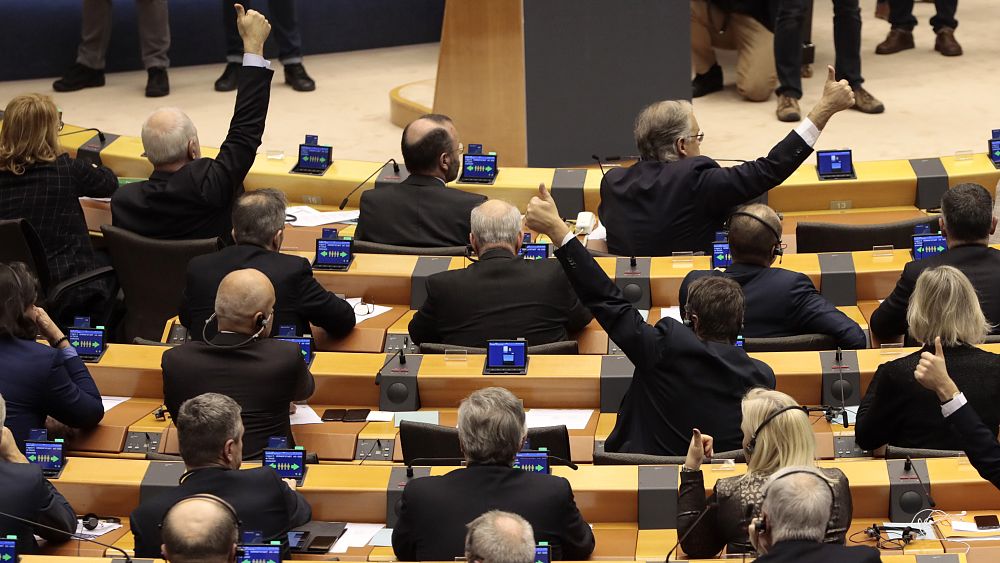
The death of David Sassoli came at the end of his two-and-a-half-year term as president of the European Parliament.
The process to replace him was already underway and now on Tuesday, the election will take place during a session of the parliament in Strasbourg.
Whoever wins the election, will be the parliament’s 32nd president. There have been 31 since the founding of the European Parliament in 1952, 16 of whom have served since the first European elections were held in 1979.
The German Socialist Martin Schulz was the only president to serve two terms. Alcide De Gasperi, the Christian Democrat MEP and former Italian prime minister, died while he was at the beginning of his mandate and was replaced for the remainder of it.
How is a new European Parliament president elected?
Presidential candidates can be put forward either by a political group or by a group of MEPs reaching the so-called low threshold, which means 5% of members, or 36 out of 705 when all seats are filled.
The president is elected by an absolute majority of valid votes – 50% plus one – cast by secret ballot. Blank or spoiled votes are not taken into account in this calculation.
If the first round does not deliver a winner, the same or other candidates can be nominated for a second and third round, under the same conditions. If no one is elected after the third round, the two candidates with the most votes in this round proceed to a fourth and final vote.
The newly-elected president may then deliver an opening address before presiding over the election of the remaining members of the parliament’s bureau. Appointments to parliamentary committees for the rest of the legislative term are then confirmed during the same plenary session.
All elected offices in the parliament (the president, vice-presidents, quaestors, committee and delegation chairs and vice-chairs) are renewed every two and half years – at the start of the five-year term and halfway through.
What is the role of the European Parliament president and how important is it?
The role is a largely ceremonial one. According to the official website of the European Parliament, the duties of the president include representing the institution “vis-à-vis the outside world and in its relations with the other EU institutions”.
The president also chairs the Parliament’s plenary sessions, both when MEPs gather in Strasbourg once a month and also in Brussels.
If there are any legal matters related to the parliament, then the president deals with these, while also overseeing the work of the Parliament and its constituent bodies, as well as the debates in plenary and ensures that parliament’s rules of procedure are adhered to.
When EU leaders meet during a summit, the president lays out where the institution stands on issues that will be discussed at the meeting.
As well as the European Council President, the European Parliament President signs all laws adopted under the so-called ordinary legislative procedure, in order for it to become official legislation, as well as under the co-decision procedure.
Who is in the running to be the European Parliament’s next president?
This time around, four candidates from different political groups are seeking the presidency.
The frontrunner and MEP expected to win is Roberta Metsola, 42, who was the first vice-president during Sassoli’s term and is the official candidate of the centre-right European People’s Party (EPP) Group.
She wants to run a forward-thinking European Parliament.
“What we are looking for is a re-energised renewal of a Parliament that looks forwards with a very modern way of doing politics,” Metsola said.
The Greens have proposed Alice Bah Kuhnke, 50, from Sweden. For her, it is key to elect a progressive and skilled leader.
“Finally, the European Parliament’s different political groups view competence as the biggest factor that should be what the candidate carries. So, I am very proud to be one of the competent persons and we happen to be several women among the candidates and that’s great,” Bah Kuhnke told Euronews.
Among other candidates from the smaller groups is Spanish MEP Sira Rego, representing the Left Group (GUE/NGL).
She claims she’s running in a “symbolic way”, but with a wider purpose.
“We need to have social muscle, muscle in the public services to face any challenge,” Rego said. “We have seen that the COVID-19 crisis has put us in front of the mirror of the vulnerabilities we have when we lose public services and we believe that this is a substantial element, in addition to employment policies and to dignifying wages.”
Polish MEP Kosma Złotowski, from the European Conservatives and Reformists (ECR) Group, is the only man challenging the three women.
In an interview with Euronews, he said that rule of law is one of the priorities close to his heart, an issue that his political party and government back home are experiencing trouble with.
“We are talking about the rule of law in Poland, for instance, or in Hungary, but are we here in the Parliament doing all according to the rule of law. In my opinion, no,” Złotowski said.
The new president is expected to be announced on Tuesday.